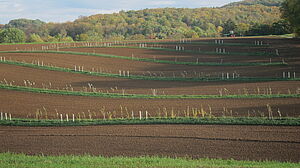The term sustainable farming systems covers a wide range of topics within agriculture and has become increasingly important in recent years. Whenever agriculture is practised, this means an intervention in ecosystems. As far as possible, these interventions should be designed in such a way that they have as little impact as possible on ecosystems and ecosystem services to obtain the natural resources soil, water and biodiversity for the future.
In this context FiBL has following main topics:
- Groundwater protection in and through organic agriculture
- Innovations and systems for agriculture adapted to climate change
- Organic seed production and breeding
- Research on Inputs for organic production
In doing so, we look not only at organically managed land but also at innovative systems in conventional farming. The goal: We want to make land management more sustainable overall and make newly gained knowledge accessible to a broad audience of practitioners and scientists.
Farming systems can only be sustainable if individual modules support each other. Therefore, when assessing sustainability, we do not look at any measure in isolation. Rather, it is necessary to always see the complex as a whole and to classify individual elements accordingly.




